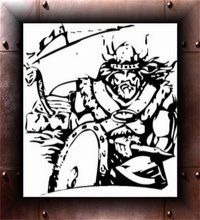There is an old saw in philosophy that cuts this way, "If a tree falls in the woods, and there is no one there to perceive it, then does it make a sound?" Philosophical skeptics such as David Hume and Bishop Berkeley are largely responsible for the notion. They were so consumed with the mechanics of human perception they doubted the existence of a world that existed outside the human mind. Gravebinder and I were knocking around an idea for a story and this notion of perception came up in regards to freedom. If there is a secret cabal (you know, like the vast neocon conspiracy to wrest control of our government) influencing/manipulating society without their knowledge, is that society free? Is their freedom contingent on their own perception? Is ignorance really bliss? Seriously, in terms of perception, if a deal is made between two parties, and both parties are satisfied by the deal, haven't they both come out ahead because of their perceived value of the exchange in question? I pay a buck fifty for the Sunday paper because I believe the value of the contents are worth more than my buck fifty, and the newspaper company is convinced the buck fifty is worth more than the paper (the paper is at least suitable to wrap fish). Too capitalist a perspective? Or is freedom not a commodity that can be valued/traded in a market? For Gravebinder and me, the notion was relative to the observer. If I am unaware of the manipulation moving me in a specific direction, then I would consider myself free to act. If and when I become aware of the manipulation, then I also become aware of the constraints on my freedom. The question becomes whether or not there is a locus of perception greater than myself that defines an objective reality that everyone shares. Is there an objective reality? Does it make sense for us to hash things out for the best course of action? For Bishop Berkley it makes sense, and Ronald Knox wrote a limerick that comments on why: There was a young man who said "God "Dear Sir, your astonishment's odd; I like these limericks, Gravebinder likes these limericks, and I figured you might like them. A last question to everyone then: Does the tree continue to be? Cheers all.
Must think it exceedingly odd
If he finds that this tree
Continues to be
When there's no one about in the Quad."
I am always about in the Quad
And that's why this tree
Will continue to be
Since observed by Yours faithfully, God."
Tuesday, July 17, 2007
A Tree Falls in the Woods…
Posted by
The Skald
at
1:56 AM
![]()
Labels: Fun, Philosophy
Subscribe to:
Comment Feed (RSS)



|